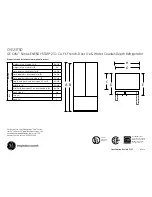
28
28
28
28
28
28
■
Avoid exposing stainless steel appliances to caustic or
corrosive elements such as high-salt, high-moisture or high-
humidity environments. Damage due to exposure to these
elements is not covered under the warranty.
NOTES:
■
If unintentional contact does occur, clean plastic part with a
sponge and mild detergent in warm water. Dry thoroughly with
a soft cloth.
■
Just because a cleaner is a liquid does not mean it is
nonabrasive. Many liquid cleansers formulated to be gentle
on tile and smooth surfaces still damage stainless steel.
■
Citric acid permanently discolors stainless steel. To avoid
damaging the finish of your stainless steel refrigerator:
Interior Cleaning
IMPORTANT:
Refrigerator shelves with under-shelf, LED lighting
are not dishwasher safe.
1.
Unplug refrigerator or disconnect power.
2.
Hand wash, rinse, and dry removable parts and interior
surfaces thoroughly. Use a clean sponge or soft cloth
and a mild detergent in warm water.
NOTE:
Do not use abrasive or harsh cleaners such as window
sprays, scouring cleansers, flammable fluids, cleaning waxes,
concentrated detergents, bleaches, or cleansers containing
petroleum products on plastic parts, interior and door liners,
or gaskets.
3.
Plug in refrigerator or reconnect power.
Condenser Cleaning
There is no need for routine condenser cleaning in normal home
operating environments. If the environment is particularly greasy
or dusty, or there is significant pet traffic in the home, the
condenser should be cleaned every 2 to 3 months to ensure
maximum efficiency.
If you need to clean the condenser:
1.
Unplug refrigerator or disconnect power.
2.
Remove the base grille.
3.
Use a vacuum cleaner with a soft brush to clean the grille, the
open areas behind the grille, and the front surface area of the
condenser.
4.
Replace the base grille when finished.
5.
Plug in refrigerator or reconnect power.
Lights
The lights in both the refrigerator and freezer compartments
are LEDs which do not need to be replaced. If the lights do not
illuminate when the door or drawer is opened, call for assistance
or service. In the U.S.A., call
1-800-253-1301
. In Canada, call
1-800-807-6777
.
Vacation and Moving Care
Vacations
If You Choose to Leave the Refrigerator On While
You’re Away:
1.
Use up any perishables and freeze other items.
2.
If your refrigerator has an automatic ice maker and is
connected to the household water supply, turn off the water
supply to the refrigerator. Property damage can occur if the
water supply is not turned off.
3.
If you have an automatic ice maker, turn off the ice maker.
NOTE:
Depending on your model, raise the wire shut-off arm
to Off (arm up) position, or press the switch to OFF.
4.
Empty the ice bin.
Models with Vacation Mode Feature
■
Turn on Vacation mode. See “Using the Controls.”
NOTE:
Activating Vacation mode does not turn off the
ice maker.
If You Choose to Turn Off the Refrigerator Before
You Leave:
1.
Remove all food from the refrigerator.
2.
If your refrigerator has an automatic ice maker:
■
Turn off the water supply to the ice maker at least one
day ahead of time.
■
When the last load of ice drops, raise the wire shut-off
arm to the Off (up) position or press the switch to OFF,
depending on your model.
3.
Empty the ice bin.
4.
Turn off the Temperature control(s). See “Using the Control(s).”
5.
Clean refrigerator, wipe it, and dry well.
6.
Tape rubber or wood blocks to the tops of both doors to prop
them open far enough for air to get in. This stops odor and
mold from building up.
Moving
When you are moving your refrigerator to a new home, follow
these steps to prepare it for the move.
1.
If your refrigerator has an automatic ice maker:
■
Turn off the water supply to the ice maker at least one day
ahead of time.
■
Disconnect the water line from the back of the refrigerator.
■
When the last load of ice drops, raise the wire shut-off arm
to the Off (up) position or press the switch to OFF,
depending on your model.
2.
Remove all food from the refrigerator and pack all frozen food
in dry ice.
3.
Empty the ice bin.
4.
Turn off the Temperature control(s). See “Using the Control(s).”
DO USE
DO NOT USE
✔
Soft, clean cloth
✘
Abrasive cloths
✘
Paper towels or newsprint
✘
Steel-wool pads
✔
Warm, soapy water
✘
Abrasive powders or liquids
✘
Ammonia
✘
Citrus-based cleaners
✘
Acidic or vinegar-based cleaners
✘
Oven cleaners
✔
For heavy soil,
ONLY a stainless
steel cleaner
designed for
appliances. To
order the cleaner,
see “Accessories.”
✘
Stainless steel cleaner is for
stainless steel parts only! Do not
allow the Stainless Steel Cleaner
and Polish to come into contact
with any plastic parts such as
the trim pieces, dispenser
covers, or door gaskets.
Do not allow these substances to remain on the finish
✘
Mustard
✘
Citrus-based sauces
✘
Tomato juice
✘
Citrus-based products
✘
Marinara sauce









































